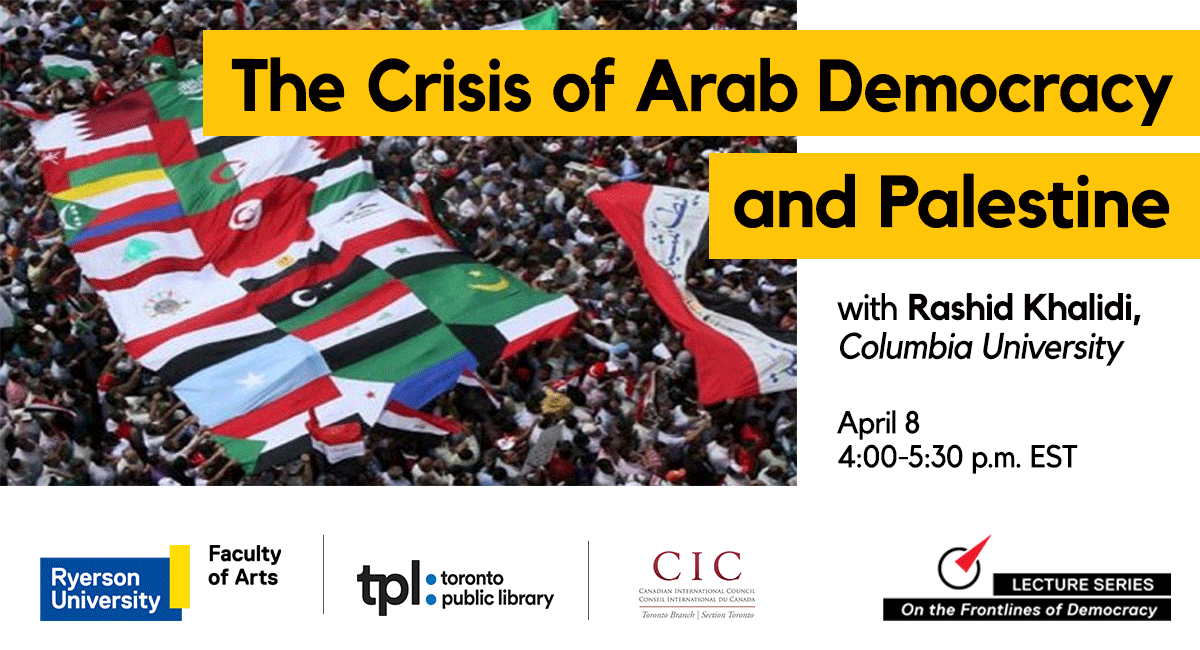The Crisis of Arab Democracy and Palestine
- Date
- April 08, 2021
- Time
- 4:00 PM EDT - 5:30 PM EDT
- Location
- Online
- Open To
- All
The Crisis of Arab Democracy and Palestine
Starting in the 1970s, many autocratic regimes in the world suffered mounting crises, inaugurating democratic transitions across Latin America, Sub-Saharan Africa and Asia. The Middle East and North Africa remained a regional anomaly, however, despite promising experiments in constitutional reform in the early twentieth century and parliamentary government in several countries after WWII. The mass protests and political revolutions unleashed a decade ago by the Arab Spring, forcing several dictatorships to fall, suggested its democratic moment had finally arrived. Yet the hopes remain largely unrealized. And Palestinian demands for self-determination, although supported by public opinion across the region, appear more elusive than ever.
Unrepresentative regimes in the Arab world, often dependent on foreign patrons, continue to frustrate popular aspirations. But we cannot understand their resilience without grasping the long history of colonialism, great power interventions during the Cold War and the follies of the post-9/11 War on Terror.
The critically acclaimed historian and political commentator, Rashid Khalidi, examines these struggles for democracy in conversation with Sanjay Ruparelia.
A special collaboration between Ryerson University, Faculty of Arts, and the Toronto Public Library. Co-sponsored by the Canadian International Council.
About the Speaker and Discussant:
Rashid Khalidi is Edward Said Professor of Modern Arab Studies at Columbia University. He received a B.A. from Yale University in 1970 and a D. Phil. from Oxford University in 1974, and has taught at the Lebanese University, the American University of Beirut, and the University of Chicago. He was President of the Middle East Studies Association, is co-editor of the Journal of Palestine Studies. He served as an advisor to the Palestinian delegation to the Madrid and Washington Arab-Israeli peace negotiations from October 1991 until June 1993.
Khalidi is author of eight books, including The Hundred Years’ War on Palestine: Settler-Colonial Conquest and Resistance, 1917-2017 (2020), and Palestinian Identity: The Construction of Modern National Consciousness (rev. ed. 2010), and has co-edited three other books and published over 110 academic articles. He has written op-eds in the New York Times, Washington Post, and many other newspapers, and has appeared widely on TV and radio in the US and abroad.
Sanjay Ruparelia is the inaugural Jarislowsky Democracy Chair, and an Associate Professor of Politics, at Ryerson University. His research examines the politics of democracy, inequality and development in India, China and the postcolonial South. He is the author of Divided We Govern: Coalition Politics in Modern India (2015), editor of The Indian Ideology (2016), and co-editor of Understanding India's New Political Economy: A Great Transformation? (2011).
About the series:
On the Frontlines of Democracy is a new public lecture series to analyze its prospects in the twenty-first century. Around the world, democracies face serious challenges, old and new. Can we protect our constitutional democracies in an era of popular mistrust, severe partisanship and resurgent nationalism? Can they reduce inequalities of power, wealth and status, defend deep diversity and confront climate change in the new digital age? Can we develop innovative strategies to revitalize civic engagement and empower public institutions to renew the promise of democracy? And what lessons can Canada offer, and learn, in a spirit of dialogue required in our post-western world?
